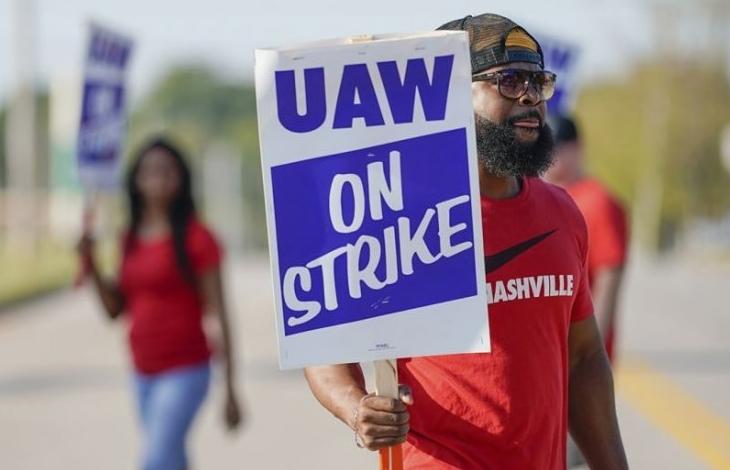In a recent survey, conducted on May 3-4, when asked how they expected the strike to affect their customers’ planned purchases if it lasted 30 days or more, Case IH and New Holland dealers responded: mixed. Many felt that the impact of the strike would have little impact on the already complex supply chain situation, with one New Holland dealer saying: “My customers already know that we won’t get much until the autumn anyway, and it will be very limited. as we are a NH dealer.”
Another Case IH dealer agreed, stating, “The equipment has already been sold in autumn, so the impact will be for the fourth quarter of 2022 / first quarter of 2023. As equipment is already scarce, I don’t think it will change behaviour.”
Thirds were more concerned about the outcome when one Case IH dealer stated, “Customers are reaching a point where price increases are starting to be met with less acceptance. Add to that unions demanding more while farm input costs go up and margins go down. it’s not a good image. I don’t think it will make my customers buy the equipment.”
More than one CNH dealer mentioned the possibility of their customers switching to other brands if they cannot get equipment from them. “Customers will turn to who ever has the equipment they need/need to have… No stock, no sales,” said one New Holland dealer. Another Case IH dealer said: “Our competitors (Deere/AGCO) have caught up with us and are getting good supplies. This is now being used against us.”
See full list of dealer responses by brand below.
How do you think it will affect your customers’ planned purchases if the strike lasts 30 days or more?
Case IH dealers :
- Customers are reaching a point where price increases are starting to meet with less acceptance. Couple this with unions demanding more while agricultural inputs go up and margins go down – it’s not a good image. I don’t think it will get my customers to buy equipment.
- Go for the competition.
- There is not much of an impact on purchases at the moment. CIH is not currently taking new orders for model year 23, and we have long since sold out of the current model year 22 products. This just delays retail deliveries even further, which our customers have been waiting a long time for.
- Their purchases will be delayed.
- The equipment is already sold out before the autumn, so the impact will be for Q4 2022 / Q1 2023. As the equipment is already short, I don’t think this will change behaviour.
- Brand switch. MUD customer inventory turnover is out of sync.
- They won’t change anything.
- Very frustrating.
- Depends on what it affects. We have NOT been notified of the possibility of a strike!
- I don’t see any difference. We can’t order a new tractor today.
- Farmers will consult each other about having to wait and pay more because of the wait. If JD customers had to wait and pay more; Case IH customers will at least understand.
- Planned purchases are already scheduled, 100% of our distribution is sold at retail, and production is scheduled for the 2022 model year, built by October 1. The question is, will the factories be able to deliver on production promises for this year, given the unknown duration of the strike?
- Our competitors (Deere/AGCO) have caught up with us and are well supplied. This is currently being used against us.
- They will look for other brands when CIH can’t provide equipment in an acceptable time frame.
- Planning ahead is more.
- Yes look elsewhere.
- We will lose market share.
- I don’t think this strike will affect us much as for us it will only affect the Magnum plant. We can no longer order Magnum tractors and there will be very few this year as we are only getting YSR units.
- Strongly falling demand.
- Will affect the autumn purchases.
- At this point we will run out of stock and sold retail orders may start to be cancelled because customers refuse to take delivery on time or even longer.
- We couldn’t get Magnums out of Racine before, so don’t think this will affect us.
- Not at all, we could not order new machinery after 1-10-22 for this season!
- As the supply chain is already under stress, additional deterioration could seriously affect the spring plant.
- With the current availability, a strike would delay deliveries, further affecting customers’ tax planning.
- Change sources and brands.
- They will buy other brands.
- It is unknown at the moment.
- We couldn’t get equipment before the strike – they were cancelling more orders than they were sending. Instead of looking at one year, they may have to stretch to 2-3 years.
- This will put year-end and spring 2023 procurement at risk.
- It will just push the shipments further. Someone might say, “I am looking for equipment as the lead time is increasing.
- They will buy brands that are capable of building and delivering the product.
- Not by much. The last strike CNH managed to keep production with replacements and keep supply very close to what it was.
New Holland dealers :
- My customers already know that we won’t get much before autumn anyway, and it will be very limited as we are a NH dealer.
- No problem.
- All stock has been slow for 12 months or longer.
- No difference.
- Customers will go to whoever has the equipment they need/should have. No inventory, no sales.
- There’s nothing to change.
- I don’t think it will have much impact. Things are already taking much longer than usual, so a few weeks won’t make much difference anyway.
- They’ve already suffered because they can’t get enough product.
- Delays in delivery.
- No impact.
- Negative.
- Procurement plans will have very little impact. However, delivery delays may affect our customers’ plans if the strike lasts more than 60-90 days.
AGCO dealers :
- The supply chain is so out of whack that I don’t think it will make a difference.
- Switch to AGCO.
- They will change their mind about buying the CNH product.
John Deere dealers :
- As far as we are concerned, I would say it won’t affect us much unless the details become an issue.
- The timing of the short strike will limit the impact of planned purchases. Buyers will make purchase plans for 2022. If it lasts more than 30 days, we will start participating in 2023 early-order programmes, which may redirect some customers to other brands.
- There is a very small effect.
- Customers are wondering when it will be in stock and if the price will increase before delivery. And I get a dated model year or current
- Buy from other brands.
- They were already behind because of supply chain issues, it only made business worse and created more problems for customers.
- I don’t see any change.
- Very little.
- Probably not much change, still nothing to gain.
- There will be a 60-90 day strike and the supply chain will stretch again.
- Not much will change. They are already scrambling.
- CNH will not allow this strike to go on for long.
Kubota dealers :
- They have the inventory and we don’t.
- We can’t get anything now, so it will be even worse.
- Minimal effect.
- Somewhat lower.
- Customers will buy from a dealer/manufacturer who has stock. The JD strike has made unions and non-unions think twice. In the current environment, manufacturers are facing lack of good manpower, supply problems and a union strike? Products will continue to be late and late to the end user. Prices will rise, spurring inflation.
- I suppose we could see farmers who were not normally interested in trying something new, and they were willing to try something when they needed it.
- We don’t foresee any changes with our customers because of the CNH strike.
Other/short-term dealers:
- No factor.
- After John Deere gave up as quickly as they did, it was inevitable that other manufacturers would have labour issues as well. When the agricultural economy goes down, as it always does, will the unions go for wage cuts?
- Further delay, supply is so limited everywhere. Now, where else are they going to go?
Further comments/thoughts on the strike
Case IH dealers :
- I don’t blame the workers for the strike. When the CEO’s salary is 17 million, I’ll get fed up too. No one is worth that kind of money. These are workers straining their bodies to produce a revenue generating product for the company!
- This needs to be resolved quickly. We are already behind in production and this is causing a lot of problems with the entire line of CNH equipment. These shortages and problems are forcing the customer to be a quality control department, and with the problems we continue to face, we will continue to lose business. CNH needs to step up its game.
- This is ridiculous. Right now we cannot get the equipment that is in the factory and it is expected to get worse.
- This is after the COVID shutdown. I am sure they were compensated during this. So they were paid to stay home, I’m pretty sure. And now you want to strike. I know some things probably need to be changed. But I bet a lot of good people would like to work there.
- An opportunistic strike.
- The 401,000 unionised workers are comparable to federal bureaucrats. Significantly higher than retail staff, parts, service, sales.
- Couldn’t order inventory before the strike and still can’t, so I don’t see much change in anything.
- I hope it gets resolved.
- We cannot tolerate any more price increases. At the moment it is extremely inappropriate in all aspects of what we buy from CNH.
- The cars are already too high, can’t afford much more price increases.
- If management takes a stand; they lose. If management concedes; they lose. Typical lose/lose situation. Racine should not be surprised if future CNH production needs come from other sources.
- It is too early to say what the consequences will be. It depends on the duration and actual production shipments. Of course, a strike will not help meet our initial sales forecast.
- Orders take forever to reach dealers, what else in 60 days?
- CIH’s non-union institutions are doing well and are proud of the brand they maintain. CIH should learn lessons from this business model.
- Deere and CIH strikes will affect future sales. The uptrend we are currently in will eventually revert to a downward trend, which will lead to lower demand for new, and cash flow will become more of an issue with lower raw material prices and higher interest rates.
- I understand that the union wants better benefits and pay for its members, but dealers and farmers who rely on the products they produce do not have the luxury of going on strike and negotiating for higher wages and benefits. Maybe the UAW should remember that they help feed the world when they get greedy, and they do it better than many people.
- All leverage is on the union side. The dealers are irrelevant to both sides.
- We need the product and the workers will never get back the wages lost during the strike. No one wins.
- Thanks to the UAW, where unions always make the best decisions for their leaders. You’d have to be a fool not to see the Dir strike result in a haggling over patterns.
- The Burlington plant supplies us with corn harvesters and some platforms. Won’t make much difference because we will only have 3 new harvesters in the autumn.
- A quick resolution is required.
- I don’t know what they are looking for.
- Case IH should have put more effort into avoiding this.
- The UAW is useless.
- The company won’t supply equipment prices for a few months, I think, knowing the strike is coming and expecting the contract strike to increase before they raise equipment prices for us dealers.
- Prices are always going up, but we hope that this will not be used to artificially raise prices sooner than necessary.
- If the unions didn’t take so many workers’ wages, the workers would have more than enough wages to live on and live off in retirement. Unions were very good at helping workers with conditions and pay in the past, now they just suck more out of the employer and cause construction costs to rise.
- Every time labour costs go up, the cost has to be passed on to others and in the end it is the customer who pays the price. Our clients can’t stand price increases.
New Holland dealers :
- As covid prices have skyrocketed, all the manufacturers are hiking prices terribly. But the day will come and the market will have to adjust when this is over, there will be a glut of equipment on the market. The return of the 1980s may be closer than we think?
- Our profits are more dependent on CNHI policy than the strike.
- We are only affected by the T8 tractors. Al T7 and lower New Holland tractors are sourced from the UK or other EU countries.
- It feels like they are striking just because of the John Deere strike.
- Should have gone with all non-union New Holland factories.
AGCO dealers :
- Let them strike. Only a fool works in a union.
John Deere dealers :
- Remembering the last CNH strike, CNH has blocked employees for some time after the strike ends. As it will only affect 2 of their 38 plants, as their CEO said, it is not a serious impact and they will hold on as long as possible. If the union extends the strike to more factories, expect a different outcome in terms of concessions and timing.
- Will employees want to cut pay when the economy changes? Probably not!
- Affordability worsens, prices go up and company shares go up.
- This is a joke.
- Plenty of labour is available, but no one wants to work when everything is in their hands.
- Thank you for asking our opinion. So very much appreciated.
- The CNHI guys were watching the Deere people strike last fall. They want the same compensation for the same type of work.
Kubota dealers :
- The strikers are now out of the world loop, very bad times, lack of ethics on the part of union leaders.
- Hard times will continue for the foreseeable future.
- A strike could result in dealers raising prices on current stocks, which are already at the lowest level to meet dealer income levels.
- I would suggest that this strike and resolutions would be most similar to the Deere strike. And as a consequence a significant increase in equipment prices.
Other/short-term dealers:
- Not a good time for union strikes when we are on the verge of a serious recession.
- I have no opinion on what CNHI workers “deserve”.
- Details of the deal have not been disclosed, so I cannot comment on the above issues. A strike will only worsen the equipment supply situation. The big concern is the supply of spare parts so that customers can farm.
- This is as silly as a John Deere strike.



